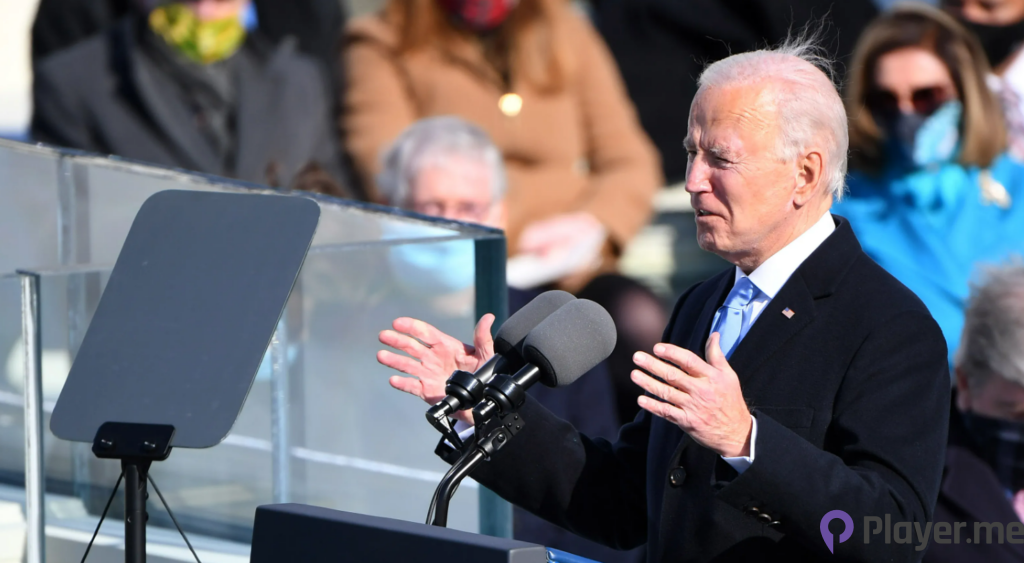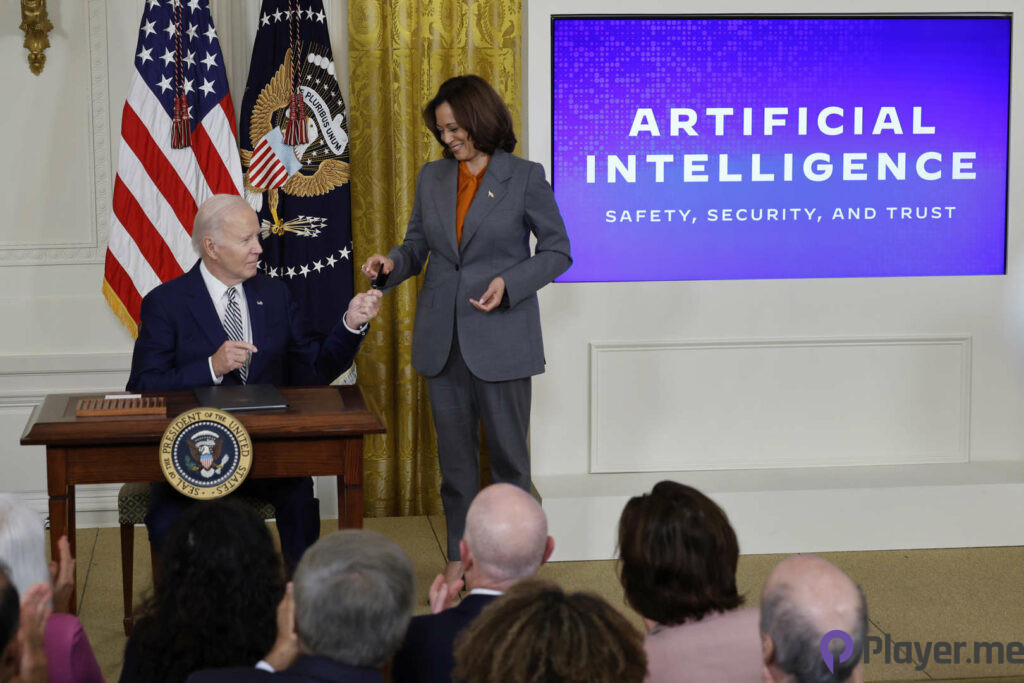President Joe Biden is actively engaging with concerns surrounding Artificial Intelligence (AI) as his administration strives to provide guidance for the rapid advancement of this technology. The White House has announced a comprehensive executive order set to tackle a range of concerns related to AI. This order is designed to address issues concerning safety and security, privacy, equity, civil rights, as well as the rights of consumers, patients, and students. Additionally, it aims to provide support for workers in the AI industry.
Furthermore, this executive order will delegate a series of tasks to federal agencies, empowering them to oversee and regulate the development of AI technology. “We can’t move at a normal government pace,” White House Chief of Staff Jeff Zients quoted Mr. Joe Biden as telling his staff, according to the AP. “We have to move as fast, if not faster than the technology itself.”
President Joe Biden has expressed the belief that the U.S. government was slow to acknowledge and address the risks associated with social media. He contends that this delay has contributed to the mental health issues observed among American youth today.
Also Read: The New Nightshade Data Poisoning Tool Lets Artists Fight Back Against Generative AI
Balancing the Benefits and Risks of AI Is Key
AI has the potential to greatly advance fields such as cancer research, climate crisis prediction, and economic and public service improvements. However, it also carries certain risks. AI can be used to create and disseminate fake images, audio, and videos, which may have significant political repercussions. Furthermore, it has the potential to exacerbate racial and social inequalities and can be exploited for criminal activities, including fraud. Balancing the benefits and risks of AI is a critical challenge for society.
According to Alexandra Reeve Givens, the President of the Center for Democracy & Technology, the Joe Biden administration is actively utilising its available resources to provide guidance and establish standards aimed at influencing the behavior of the private sector regarding AI. Simultaneously, the administration is setting an example by implementing AI practices within the federal government.
President Joe Biden’s executive order is being issued in the wake of voluntary commitments made by technology companies. The goal is to pave the way for congressional legislation and international actions that will further address and regulate the use of AI.
Related: German Military’s Metaverse Promises Virtual Foes with an AI Punch
Responsible and Ethical AI Practises Are Required
Earlier this year, the White House secured commitments from major technology companies, including Google, Meta, Microsoft, and OpenAI, to establish safety standards when developing new AI tools and models. These commitments represent a significant step toward ensuring responsible and ethical AI practises in the tech industry.
The executive order issued on Monday makes use of the Defense Production Act to mandate that AI developers share safety test results and other pertinent data with the government. In addition, the National Institute of Standards and Technology is tasked with establishing standards that will govern the development and utilisation of AI. These measures reflect the government’s efforts to enhance the safety and responsible use of AI technology.
The Department of Commerce will release guidelines that detail the labeling and watermarking of content generated through AI. According to an administration official, the order is expected to be put into effect within a timeline ranging from 90 days to a year, with a focus on addressing safety and security concerns as a priority. President Joe Biden had a meeting with his staff last Thursday, initially planned for half an hour, which extended to an hour and 10 minutes to finalise the details of the executive order.
For more AI related news, check out player.me/category/ai/.
Joe Biden “Impressed and Alarmed” by AI

Leading up to the signing of Monday’s executive order, President Joe Biden was actively involved in meetings and discussions about AI technology. He held two meetings with the Science Advisory Council to explore AI-related matters and raised the topic of AI during two cabinet meetings. During these engagements, the President engaged with tech industry leaders and advocates to better understand the capabilities and potential consequences of the technology.
Deputy White House Chief of Staff Bruce Reed noted that President Joe Biden was both impressed and concerned about the developments in AI, reflecting the complex and multifaceted nature of the technology. “He saw fake AI images of himself, of his dog,” he added. “He saw how it can make bad poetry. And he’s seen and heard the incredible and terrifying technology of voice cloning, which can take three seconds of your voice and turn it into an entire fake conversation.”
The use of AI-generated images and audio appears to have motivated President Biden to advocate for the labeling of AI-created content. He also expressed concerns about the potential for older individuals to receive phone calls from AI tools using fake voices resembling family members or loved ones, which could be part of scams or fraudulent activities. These concerns highlight the need for regulations and safeguards in the AI space to protect individuals from potential misuse and deceptive practices.
Joe Biden Denies Having Said a Certain Quote

During a speech at the White House on Monday, President Joe Biden discussed the concerns related to “Deepfakes” in connection with the signing of the executive order. He highlighted the capabilities of AI, explaining how fraudsters can create convincing fake audio recordings using just three seconds of someone’s voice.
President Joe Biden even shared a humorous anecdote, saying, “I have watched one of me on a couple of occasions. I said, “When the hell did, I say that?”. This emphasises the need for addressing the potential misuse of AI in generating deceptive content.
Also Read: The 2023 Threat Landscape From ENISA Highlights the Risk of AI-Enabled Information Manipulation
As the Curtain Falls
ReNika Moore, the director of the racial justice program at The American Civil Liberties Union, has emphasised the importance of holding the tech industry and tech billionaires accountable to ensure that new AI tools serve the interests of everyone and not just a select few. The ACLU has engaged with the administration to advocate for these principles.
Former Biden official Suresh Venkatasubramanian highlighted one of the top challenges associated with AI, which is the use of this technology by law enforcement, particularly at border checkpoints. He pointed out that automation technologies, including facial recognition and drones, can be problematic in these contexts, raising concerns about privacy and civil liberties. These challenges underscore the need for careful regulation and oversight in the application of AI in sensitive areas.
Author Profile
Latest entries
 GAMING2024.06.12Top 4 Female Tekken 8 Fighters to Obliterate Your Opponents in Style!
GAMING2024.06.12Top 4 Female Tekken 8 Fighters to Obliterate Your Opponents in Style! NEWS2024.03.18Elon Musk’s SpaceX Ventures into National Security to Empower Spy Satellite Network for U.S.
NEWS2024.03.18Elon Musk’s SpaceX Ventures into National Security to Empower Spy Satellite Network for U.S. GAMING2024.03.17PS Plus: 7 New Games for March and Beyond
GAMING2024.03.17PS Plus: 7 New Games for March and Beyond GAMING2024.03.17Last Epoch Necromancer Builds: All You Need To Know About It
GAMING2024.03.17Last Epoch Necromancer Builds: All You Need To Know About It





